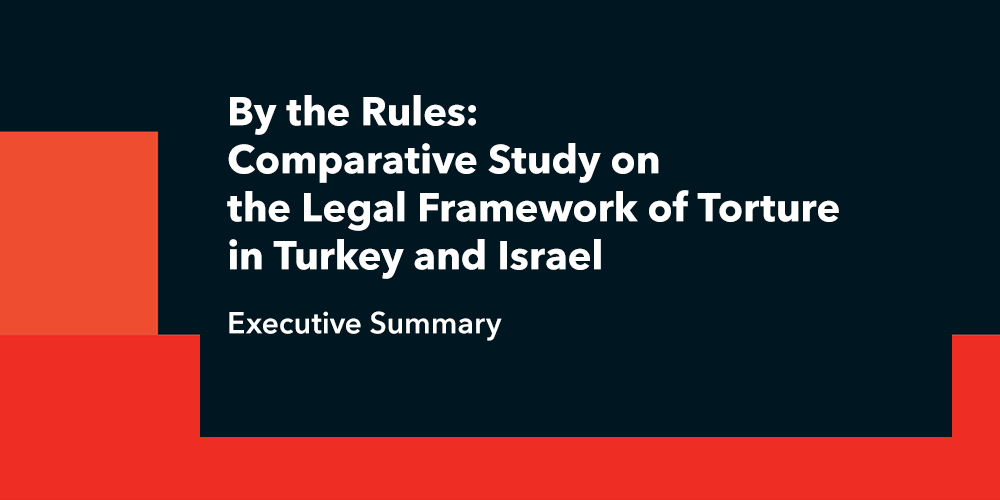INTRODUCTION AND METHODOLOGY
This research began by questioning the root causes of impunity for perpetrators of torture and other forms of ill-treatment1 in Turkey and Israel. Our main focus was the means by which states construct the regime of impunity. Yet in examining this question, we have been motivated not only by an academic curiosity regarding the nature of impunity but also by the hope of finding common tools in the fight against torture.
There are several clear differences between Israel and Turkey, in terms of their respective size, history, and ethnic and religious make-up. However, the two countries do share significant similarities, not only by virtue of their relative geopolitical proximity but mostly in terms of the challenges encountered by the state’s sovereignty. These include significant ethnic tensions, increasing protests by citizens over economic and political issues, political factions debating the state’s democratic character, and continuous violence and unrest in neighboring countries. Furthermore, both countries have a harrowing history of widespread and systematic torture in the 1980s and 1990s. Since then, however, the frequency and nature of torture have changed in various ways further examined herein.
This comparative study aims to examine this shift — in its various facets, to provide a portrait of the legal and procedural frameworks relating to torture in both countries, and illustrate the realities that they have helped shape. The question posed is whether one can identify similar patterns in the two countries which allow them to avoid taking responsibility for their current and ongoing use of torture, and resist complying with international treaties they are party to. Our research suggests that such similarities in the pattern do indeed exist, despite the differences in application.
Turkey is a country that criminalizes torture and other forms of ill-treatment by law and is a party to the European Convention on Human Rights (ECHR). Israel is a state where no criminalization legislation has been introduced, although it is a party to the United Nations Convention against Torture and Other Cruel, Inhuman or Degrading Treatment or Punishment (UNCAT)2. These facts then point to the foremost element surrounding the problem: In both countries, torture and other forms of ill-treatment continue to exist and the national legal and political conditions enable — if not promote — impunity. Both countries, despite differences in legislation, possess and employ institutional means to protect perpetrators.
We have thus attempted to assess the practice of torture and its investigation by referring to internationally accepted principles and standards that both countries are party to. First, the study assesses the domestic provisions in both countries’ laws which enable impunity after acts of torture and other forms of ill-treatment, according to international standards. Its second feature is the procedural safeguards which are meant to ensure the efficacy of the measures in preventing torture and other forms of ill-treatment and in protecting detainees from the possibility of torture by making their detention formally known and thereby assigning accountability to their holders. Therefore this study also evaluates the legislation which ensures procedural safeguards and their implementation.
The factors presented here also point out the limitations of this comparative analysis – i.e., the great difference in a local context and local legislation. Within this framework, we establish that torture serves as a key component in both states’ ongoing struggle over their own sovereignty, and is used to assert dominance over populations and groups perceived as a threat to national security and public order.
Admittedly, there is much more work to be done in each country and in drawing specific comparisons between them, especially by gathering empirical data on how laws and regulations come into play and analyzing it critically. In addition, this study does not include a historical analysis specific to the two countries, but rather maintains a focus on current conditions. It should, therefore, be viewed as a preliminary case-study in highlighting key issues. Our hope is that it will serve as the basis for further analysis, both in the specific cases of Turkey and Israel and in other regions and states.
***

